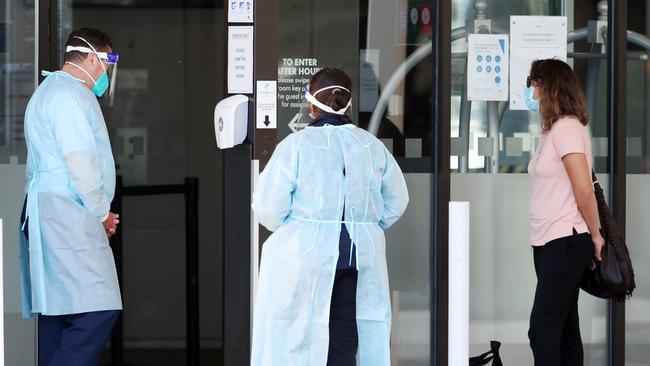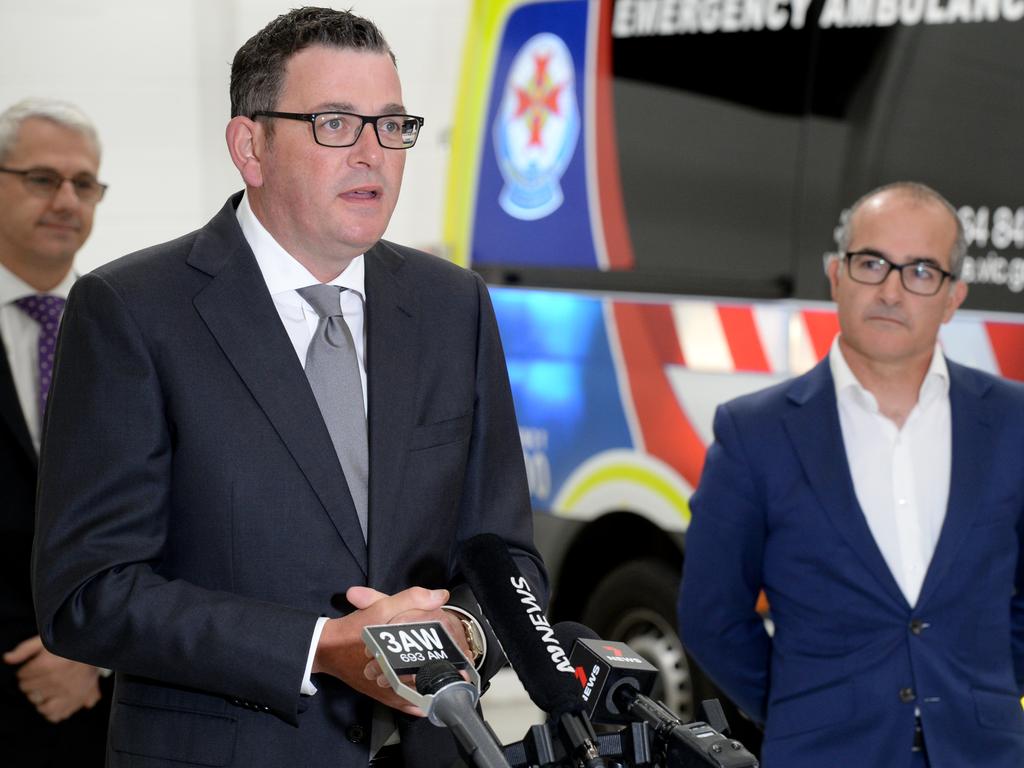Hotel quarantine: Harsh ratings by staff after virus breakout
Hotel quarantine staff rated the Victorian Health Department’s response to COVID outbreaks as a fail, confidential documents reveal.

Hotel quarantine staff rated the Victorian Health Department’s response following COVID outbreaks at three Melbourne hotels as a fail, confidential government documents reveal.
Workers were surveyed by COVID-19 Quarantine Victoria to “capture their lived experience of the outbreak and quarantine” in the wake of outbreaks at the Grand Hyatt and Melbourne Airport’s Park Royal and Holiday Inn in January and February this year.
Asked to rate their experience of the outbreak response out of ten, with one being an extremely poor response and ten being the best response, staff gave the Health Department an average rating of 4/10.
According to a confidential report by CQV’s Infection Prevention and Control, the most consistent feedback from staff was that they were provided with “conflicting” or “confusing” information from DH (Department of Health) regarding their isolation”.
“This was due to incorrect or different information regarding exposure dates and exposure risk of their families,” the report, obtained by The Australian, says.
“Staff stated they had to contact DH themselves and that they often received no emails or calls regarding their quarantine requirements.”
Staff said Operations Support Officers (OSO) working in hotels were told not to self isolate, despite believing they had more contact with COVID-positive guests than residential support officers (RSO) who were required to enter isolation.
“Survey respondents noted that they had concerns with the staffing groups and cohorting of staff,” the report says.
“The example given was that OSO’s were told not to self-isolate, whereas RSO’s were. OSO’s who had been involved in the transporting of luggage claimed to have had “more contact” with positive guests than the cohort of RSO’s stood down.”
There were also concerns about CQV staff from different roles using the same break rooms where no masks were worn eating and drinking.
“It took too long to be notified that we were close contacts,” one worker said. “I found out via the news when I returned home from a 1W shift at my new hotel.”
Another said: “Notify staff that they need to isolate much quicker.”
The survey received 53 responses from hotel quarantine staff who had worked in the hotels during the outbreaks, with 74 per cent of respondents required to self-isolate due to their exposure risk in the hotels. About half were from the Park Royal, while the rest were split between the Holiday Inn and the Grand Hyatt.
CQV was given 6/10, with the average rating of the program wide response being 5/10. Of those required to self-isolate they rated their isolation experience 6/10.
As well as internal communications within the Health Department and CQV, workers were critical of external communication with residents, stakeholders and the media, saying there was a “lack of transparency” with information regarding the outbreak.
“They felt that non affected staff were not being informed, and that the primary concern was to not alert the media,” the report says. “This made staff feel “anxious” and “concerned” with the management of the outbreak. Staff mentioned that residents were not alerted, and that information came through the media rather than from CQV or DH.”
While some staff said they were “very happy with their process of being stood down and contact tracing”, others had “very poor” experiences with subsequent low rankings overall.
“The staff experience was mentioned across the survey results, often with “confusion” and “stress”,” the report says.
“Staff mentioned they felt they were ‘just a number in a spreadsheet’ and not treated with respect when they raised concerns around their quarantine period or what they have been noticing from on the ground.
“Staff were told not to mention the outbreak to others, and this was met with feelings of insecurity. Respondents mentioned they were not contacted by their managers about their wellbeing until returning to work.”
Read the full list of hotel quarantine incident reports here
Staff also expressed concern about a “lack of emergency staff exposure procedures” and “crisis management”, believing there should be a more “holistic” and “systematic” response, rather than the fragmented response given the multiple departments and stakeholders involved.
Staffing groups who were not seen as close contacts were allowed to return home and socialise as normal, while affected groups were required to isolate at home during the outbreak.
“This raised concerns with the survey respondents, who felt there is now “respect lost for immediate line managers and management” and how they respond during a time of emergency,” the report says.
One worker said “no one was on the same page at any given time”, and another worker said: “The miscommunications and lack of information provided at any point was extremely stressful and confusing. We were advised to get several COVID tests.”


To join the conversation, please log in. Don't have an account? Register
Join the conversation, you are commenting as Logout